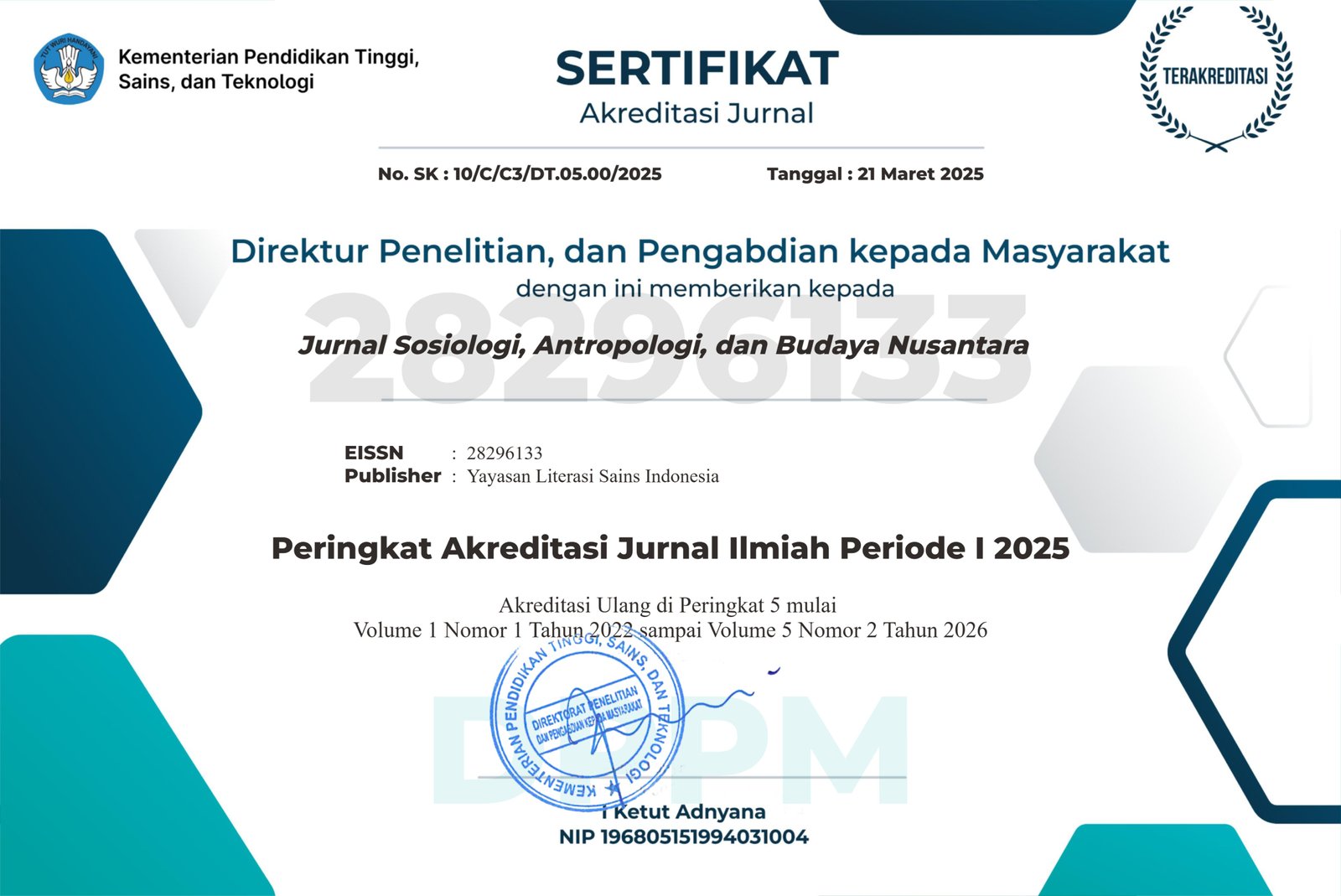PERKEMBANGAN MARGA SOLIN KE TANAH ALAS : KAJIAN SOSIOLOGI SASTRA
DOI:
https://doi.org/10.55123/sabana.v1i2.948Keywords:
Sociology of Literature, Clan, Solin, Alas, Pakpak BharatAbstract
This article is entitled Development of the Solin Clan to Tanah Alas: A Study of Literary Sociology. Problem in this study are the intrinsic elements of the development of the Solin clan to the land of Alas, the values of sociology of literature contained in the development of the Solin clan to Tanah Alas and its views the community towards the development of the Solin clan to Tanah Alas. The Development of the Solin Ke . Clan Tanah Alas is a form of story owned by the Pakpak Batak community, which precisely located in Mahala Village, Tinada District, Pakpak Bharat Regency. As for the purpose of the article The following describes the sociological literary values of the development of the Solin Ke Tanah clan: pedestal. The arrangement of stories and events that occur in the folklore of the development of the Solin clan Ketanah Alas is structured and translated into a story and explores cultural values inside it. The method used to analyze the research problem is the method descriptive with field research techniques. This study uses the theory of sociology of literature. Results research from this article found the sociological values in the story of the development of clans Solin Ke Tanah Alas, namely the Kinship System, Responsibility, Please Help, Compassion, Opposition, Religion/Belief, Health, Knowledge System, Livelihood System, and Art. And have a public view of the development of the Solin clan to Tanah Alas is a folk tale that is relevant to the people of Mahala Village in terms of patterns community life in the past. Based on the results of the study, it was concluded that According to the local community, their ancestors believed in the miracles found in The Puak Pakpak tribe, but this Mahala village community no longer believes in this with the reason that religion has emerged into the Batak community so that it forgets belief to the living things around them
Downloads
References
Danandjaja, J. (2002). Foklor Indonesia Ilmu Gosip Dogeng dan Lain-lain. Jakarta: Pustaka Utama Gratiti.
Damono, S.,D. (2005). Sosiologi sastra : Sociologie de literature, Jakarta : Yayasan Obor Indonesia.
Faruk. (2010). Pengantar Sosiologi Sastra. Yogyakarta: Pustaka Pelajar Offset.
Moleong. (2000). Metodologi Penelitian Kualitatif, Bandung: PT Remaja Posdayakarya
Nurgiyantoro, B. (2007). Teori Pengkajian Fiksi, Yogyakarta. Gadjah Mada.
Nurgiyantoro, B (2013). Teori Pengkajian Fiksi. Yogyakarta: Gadjah Mada University Press.
Ratna, N.,K. (2016). Metodelogi Penelitian: Kajian Budaya dan Ilmu-ilmu Sosial Humaniora pada Umumnya. Yogyakarta: Pustaka Pelajar.
Sabam Syahputra Manurung. (2020). PREFERENSI RUANG-RUANG BERSOSIALIASI URBAN KOTA MEDAN (STUDY KASUS KAWASAN KOTA MATSUM, MEDAN, SUMATERA UTARA). SABANA: Jurnal Sosiologi, Antropologi, Dan Budaya Nusantara, 1(1), 28–38. https://doi.org/10.55123/sabana.v1i1.257
Soemanto, B. (2017). Sapardi Djoko Damono Karya dan Dunianya. Jakarta : Grasindo.
Badan Pusat Statistik. (2020). Penduduk Indonesia menurut Provinsi 1971, 1980, 1990, 1995, 2000, 2010, dan 2020. Jakarta: Badan Pusat Statistik.
Chotib. (1997). Rekayasa Urbanisasi di Perdesaan: Salah Satu Upaya Rekayasa Demografi. Jakarta: Lembaga Demografi FE UI.
Downloads
Published
How to Cite
Issue
Section
License
Copyright (c) 2022 Martin Roberto Sihombing, Flansius Tampubolon

This work is licensed under a Creative Commons Attribution 4.0 International License.


























